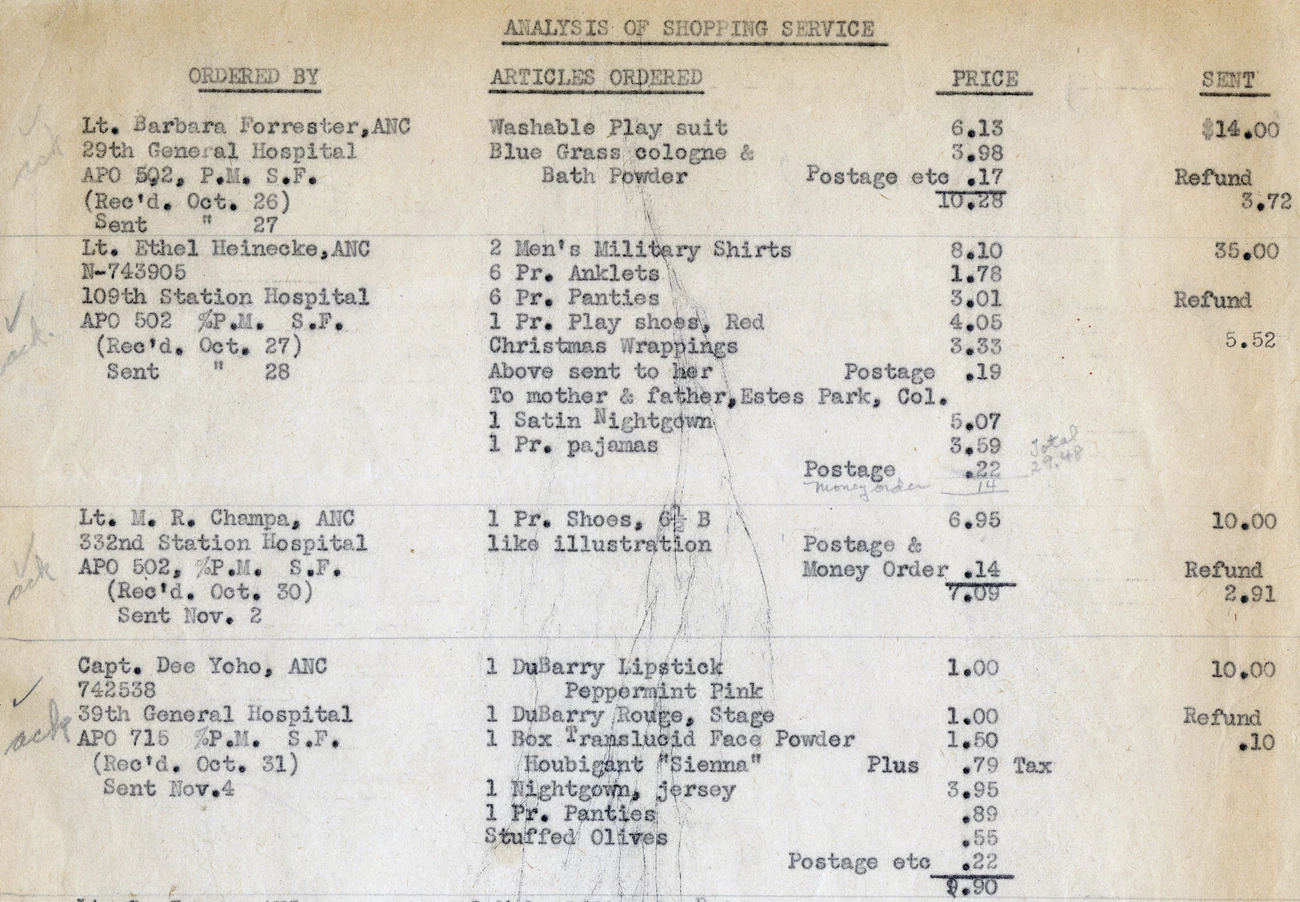Part of a series of articles titled Home and Homelands Exhibition: Resistance.
Article
Mildred Lewis’ Shopping Service Analysis

NPS Collections, GOGA 35352
During World War II, the Women’s Overseas Shopping Service offered women serving in the Pacific Theater the ability to both receive needed items from home and send gifts to loved ones at home. Orchestrated by Mildred Lewis, the Shopping Service strengthened family ties and a sense of home for those separated by war. The many personal thanks Mildred received during the organization’s run is an indication of how invaluable and appreciated the service was to female personnel.“Many of the early requests were for presents to be sent to their families here in the states, their first thought seemingly for the home folks.”1
The “Hello Girls” of WWI
When Mildred set sail on August 5, 1918 for France aboard a troopship, she joined over two hundred women telephone operators serving in WWI with the American Expeditionary Forces. Known as “Hello Girls,” the telephone operators were the first women to actively support combat operations on a regular basis. The Hello Girls generally fit the demographic of women serving overseas: they were primarily white, well-educated, unmarried, from an urban area, and possessed a degree of self-sufficiency and independence. What set them apart, however, was the specific skills they needed for the job of connecting round-the-clock calls for the U.S. Army: fluency in French and experience as switchboard operators.2Mildred’s experiences as a telephone operator shaped the rest of her life. Not only did she continue to work in the field, rising to the position of Chief Operator for the Pacific Telephone & Telegraph Company in 1934, but she also maintained her financial and personal independence by never marrying. Instead, she worked, and used the freedom this provided her to fulfill her passions for the outdoors, travel, and photography. In many ways, her family became women like her who had served overseas and who founded WOSL in 1921 to help each other. Mildred amplified this mission during WWII with the creation of the Women’s Overseas Shopping Service.
A Personal Touch
1 DuBarry Rouge, Stage
1 Box Translucid Face Powder, Houbigant “Sienna”
1 Nightgown, jersey
1 Pr. Panties
Stuffed Olives3
This list of “articles ordered” is from the records of the Mildred Lewis Collection held by Golden Gate National Recreation Area. It is part of an analysis of the Shopping Service, which besides listing the articles ordered, includes information about who ordered them, the price, how much money was sent, and whether a refund was granted if paid in excess. These lists provide a fascinating window into the lives of women serving in the Pacific Theater during WWII, particularly what they most needed and wanted when given the opportunity.

NPS Collections, GOGA 35352
All transactions were handled through letters and paid by money orders. The organization prided itself on answering each letter in a friendly tone and claimed the women understood that “here was a personal touch being given to their requests not just a cold blooded cash sale.”5 Surviving letters to Mildred confirmed how overjoyed female personnel were with the service. One typical letter from July 15, 1945 began, “Dear Miss Lewis, The first package arrived and everything was just exactly right. I feel very feminine and fragrant.” She continued, “We all enjoyed the cartoons you enclosed, and thought it was very thoughtful of you to send them.”6
Getting Back Home
As the letters demonstrate, Mildred went above and beyond in her quest to make “the going a little easier.” She provided the comforts and senses of home to women serving abroad during WWII, while helping to connect and ease the pain of loved ones separated by war. The end goal was the safe return of the women serving to protect the national homeland. One woman wrote to Mildred, “Thanks for the good wishes for getting home. It’s a big question what’s to happen to us, but we hope for the best, which is, of course, getting back home.”7Decades earlier, when the Hello Girls of WWI returned home, they learned that they would not receive a veteran’s status and the accompanying recognition and benefits. The army considered them merely civilian volunteers, not members of the military.
The Shopping Service created during WWII was a powerful example of how servicewomen looked out for each other. When Mildred could no longer serve abroad, she found a way to serve on the home front, and in the process, expanded the possibilities for women both overseas and at home.It took sixty years of fighting back before the surviving Hello Girls gained their veteran status.8 WOSL filled the gap by providing assistance to women in an environment that did not always recognize their contributions.
1 “WOSL Shopping Service,” Mildred L. Lewis Collection, c. 1880s-1965, GOGA 35352 B1 F3.
2 Jill Frahm, “The Hello Girls: Women Telephone Operators with the American Expeditionary Forces during World War I,” The Journal of the Gilded Age and Progressive Era 3, no. 3 (July 2004): 273-75, 292-93.
3 “Analysis of Shopping Service,” page 1, Mildred L. Lewis Collection, c. 1880s-1965, GOGA 35352 B1 F3.
4 “WOSL Shopping Service.” “Analysis of Shopping Service,” page 3.
5 “Women’s Overseas Shopping Service for Female Personnel,” Mildred L. Lewis Collection, c. 1880s-1965, GOGA 35352 B1 F3. “WOSL Shopping Service.”
6 Letter to Lewis from Vourlis, July 5, 1945, Mildred L. Lewis Collection, c. 1880s-1965, GOGA 35352 B2 F2.
7 “WOSL Shopping Service.” Letter to Lewis from Benson, August 28, 1945, Mildred L. Lewis Collection, c. 1880s-1965, GOGA 35352 B1 F5.
8 Fraham, “The Hello Girls,” 275. See also Senior Master Sgt. Jerry Hanes, “Hello Girls Set the Stage for Women in the Military,” Malmstrom Airforce Base, March 2, 2007.
Last updated: June 11, 2024
